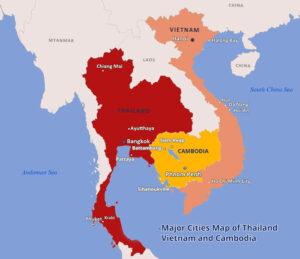Southeast Asia optimistically embraces digital automation
The 2020 World Economic Forum Future of Jobs Report forecasted that by 2025, artificial intelligence (AI) will have displaced 85 million jobs globally and created 97 million new jobs. While digital automation and AI will lead to job losses in some sectors, they will also create new opportunities in others.
This process is often framed within the context of ‘creative destruction’, where new technologies disrupt existing industries and create new ones. Despite widespread fears of rapid job displacement, the effects of automation are gradual and felt differently across firms, regions and sectors.
But the transition will be uneven, requiring proactive measures to mitigate negative impacts and foster adaptation. The impact on low-skilled workers is a particular area of concern, as routine tasks are more easily automated. Tasks requiring complex cognitive skills and social interaction are less susceptible to digital automation, potentially leading to a polarisation of the labour market.
Some industries will be more affected than others, with jobs in manufacturing, transport, retail, customer service and highly predicable work like data entry and assembly lines the first to be digitally automated. A 2025 study of more than 5000 customer support agents showed that AI tools assisted workers to resolve 14 per cent more issues per hour, with novice and low-skilled workers experiencing a 34 per cent improvement in performance when assisted by AI.
Instead of automating entire jobs, AI tools can automate specific tasks, freeing up human workers to focus on more complex, higher-value activities. AI can also act as a ‘co-pilot’, providing real-time information, recommendations or analysis to help humans perform tasks more effectively and efficiently. This augmentation of certain job scopes can complement and enhance the value of human capital.
Digital automation presents both opportunities and challenges for Southeast Asia’s workforce. While it can increase efficiency and productivity, it also raises concerns about job displacement, particularly for low-skilled workers. Addressing these challenges requires a proactive approach focused on upskilling, retraining and the reliability of social safety nets.
In 2023–24, a survey of 2326 manufacturing and related companies in Singapore, Cambodia, Laos, Vietnam, Indonesia, Malaysia and the Philippines found that digital technologies have become integral to modern business operations in Southeast Asia. Firms are adopting these technologies at varying speeds to boost efficiency, scale production and improve service delivery, reflecting differences in industrial structure, technological capacity and firm size.
In Singapore, the integration of digital automation is widespread but remains largely low-grade. 69.7 per cent of Singapore-based respondent firms have automated up to 25 per cent of their business processes, with all firms having adopted at least some form of automation. 55 per cent reported the digitalisation of service delivery, demonstrating a clear preference for customer-facing technological upgrades.
Southeast Asian firms are steadily and incrementally shifting from digital readiness to operational implementation. 63.5 per cent of Singaporean respondents plan to automate 11–50 per cent of their business processes, with only 5.4 per cent of firms anticipating no further automation. Firms in Laos and Vietnam are also planning modest digital automation increases of up to 25 per cent, while 38.8 per cent of Cambodian firms and 31.7 per cent of Malaysian firms are aiming for mid-to-high levels of digital automation (between 51–99 per cent).
Indonesia has the highest share of firms planning full digital automation at 22.2 per cent, while Philippine firms are distributed more evenly across various levels of planned automation. Southeast Asian firms’ measured and pragmatic approaches to integrating digital automation may reflect concerns over potential job losses in embracing new digital automation processes.
But Southeast Asian firms differ in how they see the potential effects of digital automation on employment. Singaporean and Vietnamese firms largely expect automation to have a limited effect on employment levels, with 40.3 per cent and 34.4 per cent of respondents respectively foreseeing no change. This relatively balanced outlook suggests that digital automation is viewed as a tool to augment, not replace human capital.
Indonesian and Malaysian firms are more optimistic, with 47.4 per cent and 36.3 per cent of respective firms expecting automation to bring some increase in employment. The Philippines is an outlier, with 68.3 per cent of firms expecting to reduce employment due to automation, indicating stronger concerns over labour displacement.
Southeast Asian firms are pursuing digital automation in a measured and targeted manner, balancing operational needs with technological opportunities. While large-scale automation remains rare, the combination of modest automation plans and optimistic productivity expectations indicate that firms see clear value in continued digital transformation. Importantly, most firms across the region do not anticipate major employment disruptions, reflecting confidence in their workforce’s ability to adapt and use technology as a complement rather than a substitute to labour.
Across Southeast Asia, this measured optimism suggests a gradual but steady trajectory towards more digitally automated, productive and resilient business operations.
Faizal Bin Yahya is Senior Research Fellow in the Institute of Policy Studies at the Lee Kuan Yew School of Public Policy, National University of Singapore.
Source: East Asia Forum





